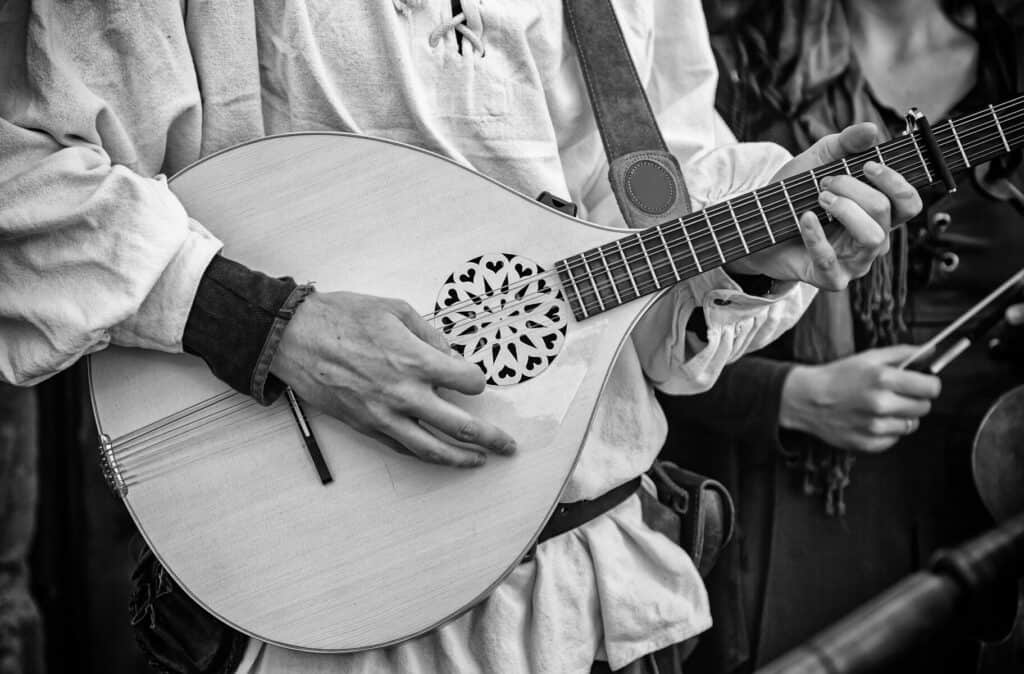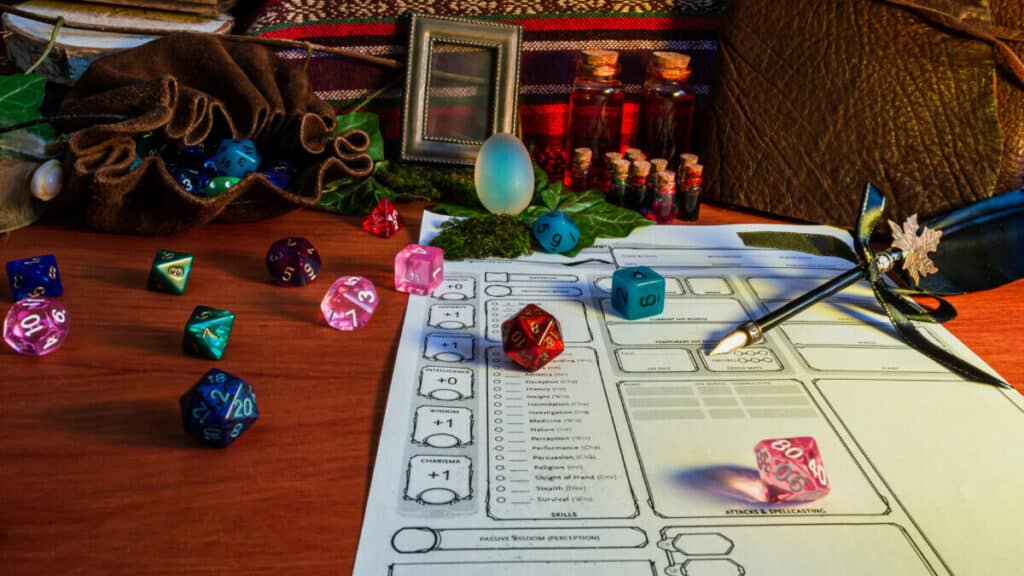
Bards are some of the most fun characters to play in Dungeons and Dragons. A master of their voice, they are skilled in both magic and combat and can face any challenge that comes their way. While some character types can feel a bit stale to play, (looking at you, fighters), a bard has enough flexibility and flavor to stretch and meet any of your whims.
There are a variety of ways that a bard can develop. Maybe he focuses on spells or bows. Maybe he will learn a little bit about everything he might encounter, become a master of disguise, or woo the ladies with his swordsmanship. With that in mind, let’s talk about the best feats to use with a bard.
Best Bard Feats 5E
Remember to check with your DM before choosing any of these feats. They may not be approved for your campaign, or your DM may not want to allow them based on the story or other limitations, as the first one of this list is a prime example of a feat that is notoriously banned. If you feel that your character would benefit from the feat, please talk to your DM.
If you can explain your reasoning to them, they may give you an exception to use it, or you can work together to adjust the feat to make sure that your campaign remains balanced.
Bards are a blast to play, so without any more ado let’s dive into the best bard feats currently in 5th Edition D&D.
1. Lucky Feat

This is probably the best feat available in the game and many argue that this feat is too powerful. The Lucky feat allows you to do anything from turn a miss into a hit, make an enemy miss you, pass a needed skill check, and more. The Players Handbook describes this feat with, “You have inexplicable luck that seems to kick in at just the right moment.”
And it is true, as this feat gives you 3 luck points to spend until you take a long rest. You can use these points to reroll your d20 anytime you make a skill check, saving throw, or attack roll against an enemy.
Along with these uses, you can also make an enemy who is attacking you reroll their attack and take the new number. This can save you from a devastating hit or pass a needed skill check. Due to how many different uses it has, it has become known as the best feat available in the game.
Check out our in-depth Lucky Feat review!
or
Check out how to handle the Lucky Feat as a DM
2. Actor Feat
The Actor feat is not only a great one for any bard, but it even seems like this is just a bardic feat. It is straight out a feat made for the bard class. If your bard likes to dabble in rogue and focus on deception and getting into a role, even better! The first part of this feat is the fact that it will give you a plus 1 to your charisma score with a max of 20, helping to round out an odd number on that all-important bard stat of charisma.
This is super important because when you use spells, you use charisma for both the Difficulty Class (DC) and as the attack modifier. This plus one can help your spells hit more often and the effects last longer.
The feat also gives two key other abilities. The first is that you get advantage (rolling 2 d20 and taking the highest roll) when you make any deception or persuasion checks in disguise as another person. This will be great for any form of infiltration mission that your party may take on or even just to trick people within the game.
The other ability you get is to perfectly mimic people. If you spend at least 1 minute listening to how they talk, then you can nearly perfectly replicate their voice and for someone to realize that it is fake, they must beat you in an insight check versus your deception, which you get advantage in. Overall, this feat makes disguising yourself or taking someone’s identity very easy for you.
Check out our in-depth Actor Feat review!
3. Alert Feat
Alert is one of the strongest feats in 5th Edition D&D, and in fact there are many who argue that it’s the second strongest feat in D&D right behind the Lucky feat. On my Tier List of top feats I have it as the second best feat, and one I almost put on the S-Tier level with Lucky, but ended up “settling” for an A+.
While often seen as a feat for rogues and martial combat characters, this feat is a great choice for bards. Bards have spells that are built towards battlefield control, sometimes with a subset to healing. That means the sooner they go in initiative, the sooner they can start doing “That bard b.s.” that the class is so famous for.
Add in the ability to avoid being surprised and this is a winning feat that lets bards take control early and shape the battlefield to their will.
Check out our in-depth 5E Alert Feat review!
4. Inspiring Leader Feat
This is another feat that plays off of the bard’s typical high charisma. However, to be able to take this feat, first you have to meet the prerequisite of having a charisma score higher than 13. As a bard, this shouldn’t be a problem, and you should be able to get this feat starting at level 1, assuming you’re using the feat-variant rules. This feat is great, as it can help give yourself and 5 other allies extra health in any upcoming fights.
This feat allows you to take 10 minutes to give an inspiring speech to you and your companions that will encourage them enough to bolster their strength and resolve to follow you into battle…metaphorically speaking. Unless your character is a valor bard your ability to help in battle comes best from the second line, after all 🙂
You get to choose 6 creatures within 30 feet, including yourself, to give extra hit points equal to your level plus your charisma score. After this, a creature has to take a short rest before it can get this extra health again.
However, no rule says you can’t give multiple, so if you have more than 6 allies, just give several speeches so everyone gets those extra hit points that last until they are taken in combat or your take a rest.
Check out our 5E Inspiring Leader Feat Guide
5. Skilled Feat

The bard is already one of the most skilled classes just behind the rogue. Typically, a bard will start with 5 skill proficiencies, 2 from their background and 3 from the bard class, but they can get a few more from their race. They also get an ability “Jack of All Trades” which allows them to be somewhat skilled in the skills they aren’t proficient in.
The Skilled feat just makes that even better. When you take this feat, which you can do as many times as you want, you get to gain proficiency in any 3 tools or skills. You can get up to 8 skills that you are proficient in or add a few instruments or tools that you are skilled in.
If you choose three more skills, then you will be proficient in 8 out of the 18, making you likely the most versatile and useful in any situation out of your party.
Check out our 5E skilled feat review!
6. Skill Expert Feat
If just getting three more skills in tools or skills of your choice isn’t fun enough for you, then the Skill Expert feat is likely going to be an even better choice. The first benefit that you get from this feat is a plus 1 bonus to any stat. You will likely want to put this in charisma, but you can also put it into constitution for more health, dexterity for more armor and damage, or another important stat that your bard uses.
The second bonus that the Skilled Expert feat gives is the ability to gain proficiency in any one skill. So, this will allow you to become more versatile within your party while skill gaining that stat boost earlier.
The last thing that you get is expertise in any one skill. This is great, as only two classes ever get expertise in a skill, meaning they add their proficiency bonus twice. Those classes are the rogue and the bard, who get theirs at levels 3 and 10.
So if you want your bard to be a skill specialist that can make a rogue whistle in admiration, on top of being a battlefield control charisma machine, this feat is perfect to double down on those skills. Since bards are one of two classes that are sometimes referred to as “skill monkeys’ because of their ability to do everything – this is a feat that makes perfect sense for many bard character builds in 5th edition.
Taking this feat will let you get expertise in a fifth skill, making you even better in most non-combat situations, often expertise will make a check in that skill a near 100% pass.
Check out our in-depth 5E Skill Expert feat review!
7. Mage Slayer Feat

This is a great feat to have for any class that engages in melee combat, which means the bard can make great use of it. The purpose of this feat is to quickly remove any spellcasters who can do massive amounts of damage in a very short time. The first benefit of this feat is that you get to have an attack anytime an enemy mage casts a spell within 5 feet of you.
Also, when you do hit a mage with an attack and they are focusing on a spell, they have to make their concentration check with disadvantage, meaning you can quickly end the effects of spells on you and your allies.
The last ability that this feat gives you is advantage against a spell when the cast is within 5 feet of you. This spell does need you to get close to the enemy mage, but if you get there, then you can make their mage nearly useless and a non-factor in the fight. This is even better when the final boss is a mage himself.
Check out our Mage Slayer feat guide here!
8. War Caster Feat (Best Bardic Feat for Spell Casting)
If you want to be more of a magic user in combat but still be able to take some hits, then war caster is an amazing choice for you. It is extra good for bards, as they specialize in both magic and have good combat abilities too. The first benefit that you get from this feat is having advantage on concentration spells when you get hit by an enemy attack.
Many of the bard’s best spells are concentration since a big part of the bard’s spell repertoire are spells that shape the battlefield or give battlefield control to their party. Getting advantage to hold concentration when they are hit means instead of losing these effects, they often get to pass and maintain them.
Here is an extremely short list of low level concentration spells bards use that benefit from this feat, and many of the best high level bard spells are concentration, too.
So if you use:
- Bane
- Invisibility & Greater Invisibility
- Faerie Fire
- Tasha’s Hideous Laughter
- Hold Person
- Silence
- Phantasmal Force
- Bestow Curse
- Polymorph
And that’s just scratching the surface.
With spell casting, you often have to have verbal, material, and somatic components. Verbal is just a few words and material supplies, but somatic is a specific arm or hand movement that normally you can’t do while holding a shield and weapon. The War Caster feat allows you to ignore any somatic components that the spell may require.
Last, if you get to have an opportunity attack against an enemy, you can cast a spell instead of doing a standard weapon attack. This spell does have to target the one enemy, but this can still mean doing much more damage and even saving an ally from a large hit.
Read our full War Caster feat guide here!
9. Tough Feat (Very Highly Rated Valor Bard Feat)
If you want to have a bunch of extra health, then this is the feat for you. Normally when you level up, you get to add whatever your constitution score is. But when you take the Tough feat, you get to add an extra 2 hit points each time.
Along with that, when you first take this feat, you gain hit points equal to twice your level. This is a great feat as it will give you an extra 40 hit points by the time you reach level 20.
Considering the bard can be on the light side of hit points and armor, a little extra padding isn’t the worst idea in the world.
Read our full 5E Tough feat guide!
10. Spell Sniper Feat
Spell Sniper is another good feat if you are looking to make your magic more powerful. The first, and likely the best, ability of this feat is that the range of your spells is doubled. This will let the spells that are weak to do short-range become much more powerful and can also let you better avoid being in combat by allowing you to cast the same spells from farther away.
It also lets you ignore the effect of those who have half or 3/4 cover, making it much more likely that you are going to hit on your spell attacks.
This feat also will give you one cantrip spell of your choice from any class spell list. Your best option is likely going to be the Warlock’s Eldritch Blast. First, you will get to use the same modifier, since warlocks use charisma as well, and at higher levels, you can shoot multiple of these beams at once, each doing 1d10 force damage. With this feat, these blasts can be shot from 240 feet away.
A very nice addition to a bard’s already impressive array of spells and skills.
Check out our 5E Spell Sniper feat guide here!
11. Fey Touched Feat

The Fey Touched feat is another good option for bards since the first option you have is a plus 1 to either your intelligence, wisdom, or charisma. It would likely be best to choose charisma for the same reasons explained earlier, but any plus 1 bonus is great.
Next, you get the Misty Step spell which is a great spell that allows you to teleport short distances around the battlefield. Along with Misty Step, you also get to pick up one other spell of your choice from the Divination or Enchantment schools of magic, both of which have great spells available.
There are few features that will give a bard’s enemies more headaches than the misty step that comes with Fey Touched…except maybe a fireball from the magical secrets most College of Lore bards will take the first chance they get!
Check out our in-depth Fey Touched feat guide!
Bardic Class Features Make A Difference!
The bard sub-classes (referred to as bardic colleges in 5th Ed) are as versatile as the bard has a reputation for being. You will definitely want to build your bard character with the subclass in mind when picking and choosing your feats, because it does make a difference.
A Bard from the College of Whispers could make a very good argument that the Actor Feat is indispensable to how that kind of bard works as this is the “rogue-bard” build without the multiclass. A good performance to avoid attention (or detection of nefarious actions) is crucial.
The more warrior oriented Bards from the College of Valor or the College of Swords will definitely want the extra hit points that come with the Tough Feat while they might not care as much about playing the part of an Actor. This is because they follow their heavy armored melee brothers and sisters into battle instead of staying with the back row. PHB Valor Bards are a lot of fun to play – but they need to be built well to avoid disaster!
The School of Lore Bard has even more spells they can acquire, including those not available to their brethren, which can make the War Caster or Spell Sniper feats even more important than normal since they are so heavily focused on the spell casting ability of the bardic class.
The bard class features tend to lean very heavily on the College they go to – even more so than many other classes and their subclass options. Keep this in mind so you pick bard feats that mesh with the rest of your build. Bards can come in many flavors – which is just part of the fun when playing these great characters.
Knowing what College of Bard you’re going to focus on will make a major difference in determining which of these great 5E feats for bards are best for your build and which ones just can’t be justified with the limited build space you have available.
Best Bard Feats 5E D&D: The Conclusion
There are many different builds of bard, so a bard from the College of Valor designed with archery in mind will want the Sharpshooter feat, while a bard forced to be a party’s healer might also want the Healer feat. I love the bard in all forms but there’s no denying that the expanded bard spell list that comes with the College of Lore bard is just too much for me to resist.
There are always situational builds but with this list you have the strongest bard feats that work for virtually every bard build in 5E and will give you a capable support caster who knows how to get it done both on and off the battlefield!
Other D&D Articles You May Enjoy
- Complete DnD 5E Feats List
- 5E Racial Feats
- Best Feats for Artificers
- How Do Hit Dice Work?
- Bard Class Guide (Coming Soon)

Proud to embrace the locally created moniker of “Corrupt Overlord” from one of the all time great Lords of Waterdeep runs, Shane is one member of the Assorted Meeples crew and will be hard at work creating awesome content for the website. He is a long-time player of board games, one time semi-professional poker player, and tends to run to the quirky or RPG side of things when it comes to playing video games. He loves tabletop roleplaying systems like Dungeons & Dragons, Pathfinder, Werewolf, Fate, and others, and not only has been a player but has run games as DM for years. You can find his other work in publications like Level Skip or Hobby Lark.
